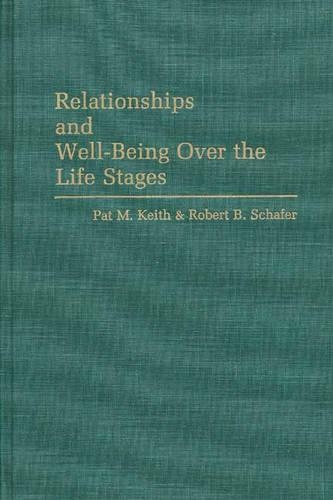
Relationships and Well-Being Over the Life Stages
(Hardback)
Publishing Details
Relationships and Well-Being Over the Life Stages
By (Author) Pat Keith
By (author) Robert F. Schafer
Bloomsbury Publishing PLC
Praeger Publishers Inc
30th September 1991
United States
Classifications
Tertiary Education
Non Fiction
306.8
Physical Properties
Hardback
192
Description
Recent social trends in America, including the increased employment of women, the dramatic growth in single-parent households, heightened attention to the ageing of the population and to older families, and changing attitudes toward gender roles, guide the focus of this study which considers personal characteristics and family relationships, and how they are linked with well-being over the life course. The authors discuss how these trends have affected work/family relationships and how the far-reaching social, demographic and economic implications of these changes inform some of the concerns of particular groups, including one and two-job families, single-parent women and their married counterparts, older and younger couples, and modern and traditional spouses. The study offers observations on persons in different circumstances which have produced, and are likely to continue to produce, lasting changes in the structure of American society.
Reviews
Keith and Schafer (Iowa State University) have extensive professional experience in the area of family studies and have produced an interesting study of a family survey in Iowa. Families were classified into five life stages: two-parent households with at least one child under six; two-parent households with at least one child between 6 and 18; married-couple households with no children and wife between 45 and 59 years; married-couple households with no children and wife 60 years or over; and single-parent households with at least one child under 19 years. These stages are examined in terms of work and family-role relationships and how these influence psychological well-being. Evaluations of roles include assessments of equity/inequity, satisfaction/dissatisfaction, and relative deprivation of work-family roles. Well-being is measured in terms of self-concept, role strain, and depression. The treatment of these and other subjects is systematic throughout the study and the statistical results are clearly presented. Although the data are drawn from only one state, the results warrant close attention by others working in this field. Current bibliography and a brief index. Should be included in any academic library with holdings in family research at both the undergraduate and graduate levels.--T.E. Steahr, University of Connecticut.-Choice
Social scientists with a particular interest in the topics in this book will enjoy specific chapters. This book could be a useful supplementary text for courses on marriage and the family.-Contemporary Sociology
"Social scientists with a particular interest in the topics in this book will enjoy specific chapters. This book could be a useful supplementary text for courses on marriage and the family."-Contemporary Sociology
"Keith and Schafer (Iowa State University) have extensive professional experience in the area of family studies and have produced an interesting study of a family survey in Iowa. Families were classified into five life stages: two-parent households with at least one child under six; two-parent households with at least one child between 6 and 18; married-couple households with no children and wife between 45 and 59 years; married-couple households with no children and wife 60 years or over; and single-parent households with at least one child under 19 years. These stages are examined in terms of work and family-role relationships and how these influence psychological well-being. Evaluations of roles include assessments of equity/inequity, satisfaction/dissatisfaction, and relative deprivation of work-family roles. Well-being is measured in terms of self-concept, role strain, and depression. The treatment of these and other subjects is systematic throughout the study and the statistical results are clearly presented. Although the data are drawn from only one state, the results warrant close attention by others working in this field. Current bibliography and a brief index. Should be included in any academic library with holdings in family research at both the undergraduate and graduate levels.--T.E. Steahr, University of Connecticut."-Choice
Author Bio
PAT M. KEITH is Professor of Sociology and Assistant Dean in the Graduate College at Iowa State University. She is co-editor of Later Life Transitions (1985) and author of The Unmarried in Later Life (Praeger Publishers, 1989). ROBERT B. SCHAFER is Professor in the Department of Sociology and Anthropology at Iowa State University. He is the author of many journal articles, monographs, and book chapters.
